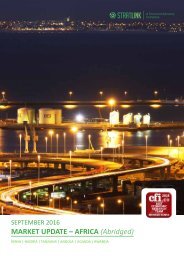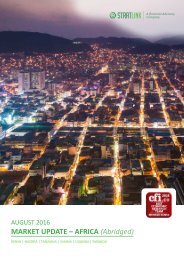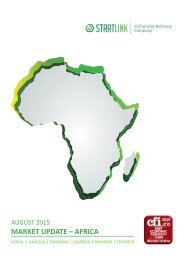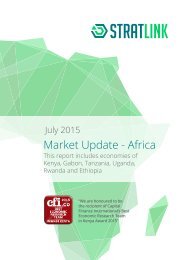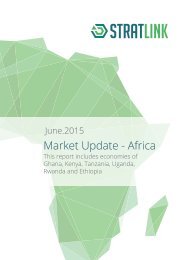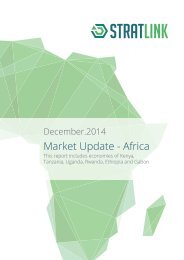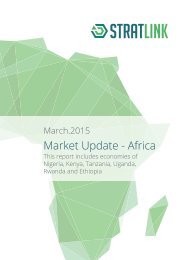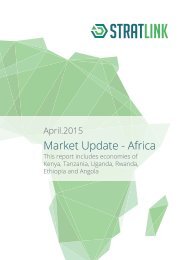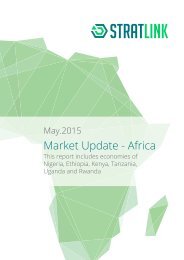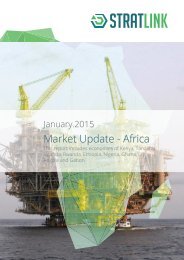Create successful ePaper yourself
Turn your PDF publications into a flip-book with our unique Google optimized e-Paper software.
MARKET UPDATE – AFRICA | <strong>February</strong> <strong>2015</strong><br />
POLITICAL OUTLOOK<br />
Uganda and International Criminal<br />
Court (ICC)<br />
President Yoweri Museveni received much<br />
needed support in his push for <strong>Africa</strong>n<br />
states to pull out of the ICC. In the concluded<br />
<strong>Africa</strong>n Union summit, Heads of State<br />
drummed up support against being signatories<br />
to the Rome Statute. Crumbled cases<br />
against Kenyan and Sudanese Presidents,<br />
Uhuru Kenyatta and Omar al-Bashir, respectively,<br />
are likely to give impetus to deliberations<br />
against ICC. Whereas there has been<br />
no indication of retributive action from the<br />
international community, concerns over<br />
inadequate domestic capacity to mete out<br />
justice in view of high crimes will top development<br />
partners’ concern. Ongoing turmoil<br />
in South Sudan will furnish a poignant case<br />
in point for tabling concern over vulnerability<br />
of states to crimes against humanity.<br />
Whereas the handing over of former Lord’s<br />
Resistance Army Commander, Dominic Ongwen,<br />
to the ICC was deemed confusing by<br />
many, we note that Uganda was compelled<br />
to do so as a signatory to the Rome Statute.<br />
ECONOMIC OUTLOOK<br />
Mining and Agriculture Lead Credit<br />
Growth<br />
Mining and agriculture registered the fastest<br />
acceleration of private sector credit between<br />
<strong>February</strong> and November 2014, pointing<br />
at investor vibrancy in the two sectors.<br />
We expect the mining sector to retain pole<br />
position in growth of credit as the country<br />
rushes to meet targeted commercial oil<br />
production by 2016. Plummeting oil prices<br />
could, however, keep activity at sub-optimal<br />
levels as investors slash exploration expenditure<br />
plans, especially if prices remain depressed<br />
into 2016.<br />
Growth in Private Sector Credit<br />
(Feb ’14 – Nov ’14)<br />
BUSINESS ENVIRONMENT<br />
Commercial bank lending rates remain high in the economy<br />
threatening growth and investment prospects for private sector<br />
players in <strong>2015</strong>. At 22.2%, Uganda’s average lending rate<br />
fares relatively poorly against Kenya’s 16.0% and presents<br />
a challenge in access to credit which is a key catalyst for a<br />
competitive business climate. According to World Bank’s Ease<br />
of Doing Business <strong>2015</strong> (ranking 189 countries), Uganda trails<br />
Rwanda and Kenya in facilitating access to credit.<br />
Ease of Access to Credit Ranking <strong>2015</strong><br />
Country<br />
Rwanda 4<br />
Ranking<br />
Kenya 116<br />
Uganda 131<br />
Tanzania 151<br />
Source: Bank of Uganda, StratLink <strong>Africa</strong><br />
New discoveries buoy investor activity<br />
In August 2014, discovery of new oil wells<br />
that increased Uganda’s projected reserves<br />
by 85.7% to 6.5 billion barrels occasioned a<br />
surge in the sector’s uptake of credit. The<br />
new estimate of reservoirs places Uganda<br />
at par with giant oil producers such as Sudan<br />
and South Sudan (combined) whose reserves<br />
are estimated at 5.0 billion barrels 5 .<br />
Egypt, with reserves estimated at 4.4 billion<br />
barrels now falls below Uganda’s capacity.<br />
Ethiopia 165<br />
Source: World Bank, StratLink <strong>Africa</strong><br />
5 Sudan accounts for 1.5 billion barrels while South Sudan<br />
accounts for 3.5 billion barrels<br />
14 | StratLink <strong>Africa</strong> Ltd.<br />
www.stratlinkglobal.com




